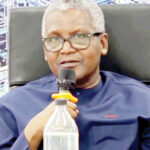A coalition of President Muhammadu Buhari’s support groups under the aegis of Nigeria First, and 100 pro-Buhari groups have protested the lingering fuel scarcity across the country.
The organisations at a rally on Friday in Abuja also exonerated the Nigeria National Petroleum Company Limited (NNPC) over the adulterated fuel importation and called for the prosecution of the companies involved.
National Convener of Nigeria First, Richard Adie, who spoke on behalf of others, described the situation as economic sabotage.
He said the government must ensure that companies that imported the fuel and their foreign partners are punished.
He said the importation of petroleum products into the country was a complex exercise that required the inputs of many stakeholders, including the NNPC, oil and gas traders; marketers and others in the value chain.
Adie said it was imperative to put the issues in proper perspective because there have been accusations that the NNPC, under the leadership of Mele Kyari, is wholly responsible for this perceived shortcoming.
“The attempt to heap the blame on the doors of the NNPC is an attempt at being clever by half in the sense that there are specifications that have been established with regards to the quality and quantity of PMS to be imported into the country by the relevant authorities through the government’s direct sales and direct purchase vendors agreement (DSDP).
“We must be mindful that the DSDP agreement is a type of swap whereby a certain amount of crude is exchanged in return for the equivalent amount of refined petroleum products.
“One of the criteria is that international companies must have a Nigerian affiliate or subsidiary or partnership with a Nigerian company engaged in downstream oil and gas business, particularly petroleum products trading.
“The implication is that importers of petroleum products into the country has left the realm of the NNPC to the international corporations and their Nigerian affiliates or partners.
“This has also ensured that the Nigerian affiliates or partners must guarantee the product quality and quantity,” Adie said.
He said that it is important for relevant authorities in the country to ensure that those behind the importation of adulterated petroleum products into the country are adequately sanctioned to serve as a deterrent to others.
He said, “The DSDP process is usually bided. Part of the requirement entails that the Nigerian counterparts ensure strict compliance to the quality of fuel imported into the country.
“The role of the NNPC is to deliver monthly crude oil lifting on a Free on Board (FOB) basis to the supplier who shall, in return, deliver petroleum products of Nigerian standard specification to NNPC on a Delivered at Place (DAP) basis, at designated safe port (s) in Nigeria, and the petroleum products to be delivered shall be equivalent in value to the Crude Oil received from NNPC subject to the general terms and conditions.
“It is thus an uncharitable endeavour for these companies to refuse to take full responsibility for breach of contract by importing petroleum products that fall short of Nigerian standards into the country.”

 Join Daily Trust WhatsApp Community For Quick Access To News and Happenings Around You.
Join Daily Trust WhatsApp Community For Quick Access To News and Happenings Around You.


